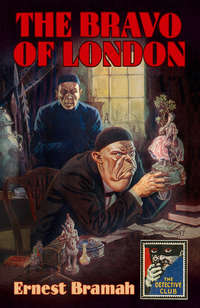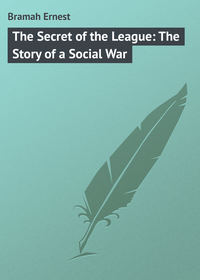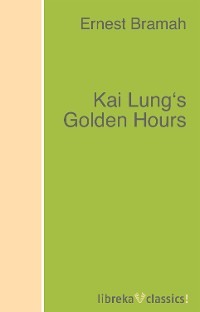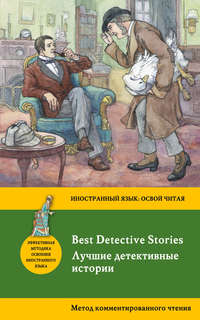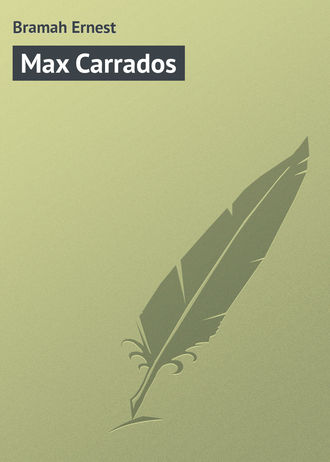 полная версия
полная версияMax Carrados
“So much is perfectly clear and yet so much is incredible,” he mused. “You insist that you alone have been in charge for the last six months?”
“I have not been away a day this year.”
“Meals?”
“I have my lunch sent in.”
“And this room could not be entered without your knowledge while you were about the place?”
“It is impossible. The door is fitted with a powerful spring and a feather-touch self-acting lock. It cannot be left unlocked unless you deliberately prop it open.”
“And, with your knowledge, no one has had an opportunity of having access to this book?”
“No,” was the reply.
Carrados stood up and began to put on his gloves.
“Then I must decline to pursue my investigation any further,” he said icily.
“Why?” stammered the manager.
“Because I have positive reason for believing that you are deceiving me.”
“Pray sit down, Mr Carrados. It is quite true that when you put the last question to me a circumstance rushed into my mind which – so far as the strict letter was concerned – might seem to demand ‘Yes’ instead of ‘No.’ But not in the spirit of your inquiry. It would be absurd to attach any importance to the incident I refer to.”
“That would be for me to judge.”
“You shall do so, Mr Carrados. I live at Windermere Mansions with my sister. A few months ago she got to know a married couple who had recently come to the opposite flat. The husband was a middle-aged, scholarly man who spent most of his time in the British Museum. His wife’s tastes were different; she was much younger, brighter, gayer; a mere girl in fact, one of the most charming and unaffected I have ever met. My sister Amelia does not readily – ”
“Stop!” exclaimed Carrados. “A studious middle-aged man and a charming young wife! Be as brief as possible. If there is any chance it may turn on a matter of minutes at the ports. She came here, of course?”
“Accompanied by her husband,” replied the manager stiffly. “Mrs Scott had travelled and she had a hobby of taking photographs wherever she went. When my position accidentally came out one evening she was carried away by the novel idea of adding views of a safe-deposit to her collection – as enthusiastic as a child. There was no reason why she should not; the place has often been taken for advertising purposes.”
“She came, and brought her camera – under your very nose!”
“I do not know what you mean by ‘under my very nose.’ She came with her husband one evening just about our closing time. She brought her camera, of course – quite a small affair.”
“And contrived to be in here alone?”
“I take exception to the word ‘contrived.’ It – it happened. I sent out for some tea, and in the course – ”
“How long was she alone in here?”
“Two or three minutes at the most. When I returned she was seated at my desk. That was what I referred to. The little rogue had put on my glasses and had got hold of a big book. We were great chums, and she delighted to mock me. I confess that I was startled – merely instinctively – to see that she had taken up this book, but the next moment I saw that she had it upside down.”
“Clever! She couldn’t get it away in time. And the camera, with half-a-dozen of its specially sensitized films already snapped over the last few pages, by her side!”
“That child!”
“Yes. She is twenty-seven and has kicked hats off tall men’s heads in every capital from Petersburg to Buenos Aires! Get through to Scotland Yard and ask if Inspector Beedel can come up.”
The manager breathed heavily through his nose.
“To call in the police and publish everything would ruin this establishment – confidence would be gone. I cannot do it without further authority.”
“Then the professor certainly will.”
“Before you came I rang up the only director who is at present in town and gave him the facts as they then stood. Possibly he has arrived by this. If you will accompany me to the boardroom we will see.”
They went up to the floor above, Mr Carlyle joining them on the way.
“Excuse me a moment,” said the manager.
Parkinson, who had been having an improving conversation with the hall porter on the subject of land values, approached.
“I am sorry, sir,” he reported, “but I was unable to procure any ‘Rubbo.’ The place appears to be shut up.”
“That is a pity; Mr Carlyle had set his heart on it.”
“Will you come this way, please?” said the manager, reappearing.
In the boardroom they found a white-haired old gentleman who had obeyed the manager’s behest from a sense of duty, and then remained in a distant corner of the empty room in the hope that he might be overlooked. He was amiably helpless and appeared to be deeply aware of it.
“This is a very sad business, gentlemen,” he said, in a whispering, confiding voice. “I am informed that you recommend calling in the Scotland Yard authorities. That would be a disastrous course for an institution that depends on the implicit confidence of the public.”
“It is the only course,” replied Carrados.
“The name of Mr Carrados is well known to us in connexion with a delicate case. Could you not carry this one through?”
“It is impossible. A wide inquiry must be made. Every port will have to be watched. The police alone can do that.” He threw a little significance into the next sentence. “I alone can put the police in the right way of doing it.”
“And you will do that, Mr Carrados?”
Carrados smiled engagingly. He knew exactly what constituted the great attraction of his services.
“My position is this,” he explained. “So far my work has been entirely amateur. In that capacity I have averted one or two crimes, remedied an occasional injustice, and now and then been of service to my professional friend, Louis Carlyle. But there is no reason at all why I should serve a commercial firm in an ordinary affair of business for nothing. For any information I should require a fee, a quite nominal fee of, say, one hundred pounds.”
The director looked as though his faith in human nature had received a rude blow.
“A hundred pounds would be a very large initial fee for a small firm like this, Mr Carrados,” he remarked in a pained voice.
“And that, of course, would be independent of Mr Carlyle’s professional charges,” added Carrados.
“Is that sum contingent on any specific performance?” inquired the manager.
“I do not mind making it conditional on my procuring for you, for the police to act on, a photograph and a description of the thief.”
The two officials conferred apart for a moment. Then the manager returned.
“We will agree, Mr Carrados, on the understanding that these things are to be in our hands within two days. Failing that – ”
“No, no!” cried Mr Carlyle indignantly, but Carrados good-humouredly put him aside.
“I will accept the condition in the same sporting spirit that inspires it. Within forty-eight hours or no pay. The cheque, of course, to be given immediately the goods are delivered?”
“You may rely on that.”
Carrados took out his pocket-book, produced an envelope bearing an American stamp, and from it extracted an unmounted print.
“Here is the photograph,” he announced. “The man is called Ulysses K. Groom, but he is better known as ‘Harry the Actor.’ You will find the description written on the back.”
Five minutes later, when they were alone, Mr Carlyle expressed his opinion of the transaction.
“You are an unmitigated humbug, Max,” he said, “though an amiable one, I admit. But purely for your own private amusement you spring these things on people.”
“On the contrary,” replied Carrados, “people spring these things on me.”
“Now this photograph. Why have I heard nothing of it before?”
Carrados took out his watch and touched the fingers.
“It is now three minutes to eleven. I received the photograph at twenty past eight.”
“Even then, an hour ago you assured me that you had done nothing.”
“Nor had I – so far as result went. Until the keystone of the edifice was wrung from the manager in his room, I was as far away from demonstrable certainty as ever.”
“So am I – as yet,” hinted Mr Carlyle.
“I am coming to that, Louis. I turn over the whole thing to you. The man has got two clear days’ start and the chances are nine to one against catching him. We know everything, and the case has no further interest for me. But it is your business. Here is your material.
“On that one occasion when the ‘tawny’ man crossed our path, I took from the first a rather more serious view of his scope and intention than you did. That same day I sent a cipher cable to Pierson of the New York service. I asked for news of any man of such and such a description – merely negative – who was known to have left the States; an educated man, expert in the use of disguises, audacious in his operations, and a specialist in ‘dry’ work among banks and strong-rooms.”
“Why the States, Max?”
“That was a sighting shot on my part. I argued that he must be an English-speaking man. The smart and inventive turn of the modern Yank has made him a specialist in ingenious devices, straight or crooked. Unpickable locks and invincible lock-pickers, burglar-proof safes and safe-specializing burglars, come equally from the States. So I tried a very simple test. As we talked that day and the man walked past us, I dropped the words ‘New York’ – or, rather, ‘Noo Y’rk’ – in his hearing.”
“I know you did. He neither turned nor stopped.”
“He was that much on his guard; but into his step there came – though your poor old eyes could not see it, Louis – the ‘psychological pause,’ an absolute arrest of perhaps a fifth of a second; just as it would have done with you if the word ‘London’ had fallen on your ear in a distant land. However, the whys and the wherefores don’t matter. Here is the essential story.
“Eighteen months ago ‘Harry the Actor’ successfully looted the office safe of M’Kenkie, J. F. Higgs & Co.; of Cleveland, Ohio. He had just married a smart but very facile third-rate vaudeville actress – English by origin – and wanted money for the honeymoon. He got about five hundred pounds, and with that they came to Europe and stayed in London for some months. That period is marked by the Congreave Square post office burglary, you may remember. While studying such of the British institutions as most appealed to him, the ‘Actor’s’ attention became fixed on this safe-deposit. Possibly the implied challenge contained in its telegraphic address grew on him until it became a point of professional honour with him to despoil it; at all events he was presumedly attracted by an undertaking that promised not only glory but very solid profit. The first part of the plot was, to the most skilful criminal ‘impersonator’ in the States, mere skittles. Spreading over those months he appeared at ‘The Safe’ in twelve different characters and rented twelve safes of different sizes. At the same time he made a thorough study of the methods of the place. As soon as possible he got the keys back again into legitimate use, having made duplicates for his own private ends, of course. Five he seems to have returned during his first stay; one was received later, with profuse apologies, by registered post; one was returned through a leading Berlin bank. Six months ago he made a flying visit here, purely to work off two more. One he kept from first to last, and the remaining couple he got in at the beginning of his second long residence here, three or four months ago.
“This brings us to the serious part of the cool enterprise. He had funds from the Atlantic and South-Central Mail-car coup when he arrived here last April. He appears to have set up three establishments; a home, in the guise of an elderly scholar with a young wife, which, of course, was next door to our friend the manager; an observation point, over which he plastered the inscription ‘Rub in Rubbo for Everything’ as a reason for being; and, somewhere else, a dressing-room with essential conditions of two doors into different streets.
“About six weeks ago he entered the last stage. Mrs Harry, with quite ridiculous ease, got photographs of the necessary page or two of the record-book. I don’t doubt that for weeks before then everyone who entered the place had been observed, but the photographs linked them up with the actual men into whose hands the ‘Actor’s’ old keys had passed – gave their names and addresses, the numbers of their safes, their passwords and signatures. The rest was easy.”
“Yes, by Jupiter; mere play for a man like that,” agreed Mr Carlyle, with professional admiration. “He could contrive a dozen different occasions for studying the voice and manner and appearance of his victims. How much has he cleared?”
“We can only speculate as yet. I have put my hand on seven doubtful callers on Monday and Tuesday last. Two others he had ignored for some reason; the remaining two safes had not been allotted. There is one point that raises an interesting speculation.”
“What is that, Max?”
“The ‘Actor’ has one associate, a man known as ‘Billy the Fondant,’ but beyond that – with the exception of his wife, of course – he does not usually trust anyone. It is plain, however, that at least seven men must latterly have been kept under close observation. It has occurred to me – ”
“Yes, Max?”
“I have wondered whether Harry has enlisted the innocent services of one or other of our clever private inquiry offices.”
“Scarcely,” smiled the professional. “It would hardly pass muster.”
“Oh, I don’t know. Mrs Harry, in the character of a jealous wife or a suspicious sweetheart, might reasonably – ”
Mr Carlyle’s smile suddenly faded.
“By Jupiter!” he exclaimed. “I remember – ”
“Yes, Louis?” prompted Carrados, with laughter in his voice.
“I remember that I must telephone to a client before Beedel comes,” concluded Mr Carlyle, rising in some haste.
At the door he almost ran into the subdued director, who was wringing his hands in helpless protest at a new stroke of calamity.
“Mr Carrados,” wailed the poor old gentleman in a tremulous bleat, “Mr Carrados, there is another now – Sir Benjamin Gump. He insists on seeing me. You will not – you will not desert us?”
“I should have to stay a week,” replied Carrados briskly, “and I’m just off now. There will be a procession. Mr Carlyle will support you, I am sure.”
He nodded “Good-morning” straight into the eyes of each and found his way out with the astonishing certainty of movement that made so many forget his infirmity. Possibly he was not desirous of encountering Draycott’s embarrassed gratitude again, for in less than a minute they heard the swirl of his departing car.
“Never mind, my dear sir,” Mr Carlyle assured his client, with impenetrable complacency. “Never mind. I will remain instead. Perhaps I had better make myself known to Sir Benjamin at once.”
The director turned on him the pleading, trustful look of a cornered dormouse.
“He is in the basement,” he whispered. “I shall be in the boardroom – if necessary.”
Mr Carlyle had no difficulty in discovering the centre of interest in the basement. Sir Benjamin was expansive and reserved, bewildered and decisive, long-winded and short-tempered, each in turn and more or less all at once. He had already demanded the attention of the manager, Professor Bulge, Draycott and two underlings to his case and they were now involved in a babel of inutile reiteration. The inquiry agent was at once drawn into a circle of interrogation that he did his best to satisfy impressively while himself learning the new facts.
The latest development was sufficiently astonishing. Less than an hour before Sir Benjamin had received a parcel by district messenger. It contained a jewel-case which ought at that moment to have been securely reposing in one of the deposit safes. Hastily snatching it open, the recipient’s incredible forebodings were realized. It was empty – empty of jewels, that is to say, for, as if to add a sting to the blow, a neatly inscribed card had been placed inside, and on it the agitated baronet read the appropriate but at the moment rather gratuitous maxim: “Lay not up for yourselves treasures upon earth – ”
The card was passed round and all eyes demanded the expert’s pronouncement.
“‘ – where moth and rust doth corrupt and where thieves break through and steal.’ H’m,” read Mr Carlyle with weight. “This is a most important clue, Sir Benjamin – ”
“Hey, what? What’s that?” exclaimed a voice from the other side of the hall. “Why, damme if I don’t believe you’ve got another! Look at that, gentlemen; look at that. What’s on, I say? Here now, come; give me my safe. I want to know where I am.”
It was the bookmaker who strode tempestuously in among them, flourishing before their faces a replica of the card that was in Mr Carlyle’s hand.
“Well, upon my soul this is most extraordinary,” exclaimed that gentleman, comparing the two. “You have just received this, Mr – Mr Berge, isn’t it?”
“That’s right, Berge – ‘Iceberg’ on the course. Thank the Lord Harry, I can take my losses coolly enough, but this – this is a facer. Put into my hand half-an-hour ago inside an envelope that ought to be here and as safe as in the Bank of England. What’s the game, I say? Here, Johnny, hurry and let me into my safe.”
Discipline and method had for the moment gone by the board. There was no suggestion of the boasted safeguards of the establishment. The manager added his voice to that of the client, and when the attendant did not at once appear he called again.
“John, come and give Mr Berge access to his safe at once.”
“All right, sir,” pleaded the harassed key-attendant; hurrying up with the burden of his own distraction. “There’s a silly fathead got in what thinks this is a left-luggage office, so far as I can make out – a foreigner.”
“Never mind that now,” replied the manager severely. “Mr Berge’s safe: No. 01724.”
The attendant and Mr Berge went off together down one of the brilliant colonnaded vistas. One or two of the others who had caught the words glanced across and became aware of a strange figure that was drifting indecisively towards them. He was obviously an elderly German tourist of pronounced type – long-haired, spectacled, outrageously garbed and involved in the mental abstraction of his philosophical race. One hand was occupied with the manipulation of a pipe, as markedly Teutonic as its owner; the other grasped a carpet-bag that would have ensured an opening laugh to any low comedian.
Quite impervious to the preoccupation of the group, the German made his way up to them and picked out the manager.
“This was a safety deposit, nicht wahr?”
“Quite so,” acquiesced the manager loftily, “but just now – ”
“Your fellow was dense of gomprehension.” The eyes behind the clumsy glasses wrinkled to a ponderous humour. “He forgot his own business. Now this goot bag – ”
Brought into fuller prominence, the carpet-bag revealed further details of its overburdened proportions. At one end a flannel shirt cuff protruded in limp dejection; at the other an ancient collar, with the grotesque attachment known as a “dickey,” asserted its presence. No wonder the manager frowned his annoyance. “The Safe” was in low enough repute among its patrons at that moment without any burlesque interlude to its tragic hour.
“Yes, yes,” he whispered, attempting to lead the would-be depositor away, “but you are under a mistake. This is not – ”
“It was a safety deposit? Goot. Mine bag – I would deposit him in safety till the time of mine train. Ja?“
“Nein, nein!“ almost hissed the agonized official. “Go away, sir, go away! It isn’t a cloakroom. John, let this gentleman out.”
The attendant and Mr Berge were returning from their quest. The inner box had been opened and there was no need to ask the result. The bookmaker was shaking his head like a baffled bull.
“Gone, no effects,” he shouted across the hall. “Lifted from ‘The Safe,’ by crumb!”
To those who knew nothing of the method and operation of the fraud it seemed as if the financial security of the Capital was tottering. An amazed silence fell, and in it they heard the great grille door of the basement clang on the inopportune foreigner’s departure. But, as if it was impossible to stand still on that morning of dire happenings, he was immediately succeeded by a dapper, keen-faced man in severe clerical attire who had been let in as the intruder passed out.
“Canon Petersham!” exclaimed the professor, going forward to greet him.
“My dear Professor Bulge!” reciprocated the canon. “You here! A most disquieting thing has happened to me. I must have my safe at once.” He divided his attention between the manager and the professor as he monopolized them both. “A most disquieting and – and outrageous circumstance. My safe, please – yes, yes, Rev. Henry Noakes Petersham. I have just received by hand a box, a small box of no value but one that I thought, yes, I am convinced that it was the one, a box that was used to contain certain valuables of family interest which should at this moment be in my safe here. No. 7436? Very likely, very likely. Yes, here is my key. But not content with the disconcerting effect of that, professor, the box contained – and I protest that it’s a most unseemly thing to quote any text from the Bible in this way to a clergyman of my position – well, here it is. ‘Lay not up for yourselves treasures upon earth – ’ Why, I have a dozen sermons of my own in my desk now on that very verse. I’m particularly partial to the very needful lesson that it teaches. And to apply it to me! It’s monstrous!”
“No. 7436, John,” ordered the manager, with weary resignation.
The attendant again led the way towards another armour-plated aisle. Smartly turning a corner, he stumbled over something, bit a profane exclamation in two, and looked back.
“It’s that bloomin’ foreigner’s old bag again,” he explained across the place in aggrieved apology. “He left it here after all.”
“Take it upstairs and throw it out when you’ve finished,” said the manager shortly.
“Here, wait a minute,” pondered John, in absent-minded familiarity. “Wait a minute. This is a funny go. There’s a label on that wasn’t here before. ‘Why not look inside?’“
“‘Why not look inside?’” repeated someone.
“That’s what it says.”
There was another puzzled silence. All were arrested by some intangible suggestion of a deeper mystery than they had yet touched. One by one they began to cross the hall with the conscious air of men who were not curious but thought that they might as well see.
“Why, curse my crumpet,” suddenly exploded Mr Berge, “if that ain’t the same writing as these texts!”
“By gad, but I believe you are right,” assented Mr Carlyle. “Well, why not look inside?”
The attendant, from his stooping posture, took the verdict of the ring of faces and in a trice tugged open the two buckles. The central fastening was not locked, and yielded to a touch. The flannel shirt, the weird collar and a few other garments in the nature of a “top-dressing” were flung out and John’s hand plunged deeper…
Harry the Actor had lived up to his dramatic instinct. Nothing was wrapped up; nay, the rich booty had been deliberately opened out and displayed, as it were, so that the overturning of the bag, when John the keybearer in an access of riotous extravagance lifted it up and strewed its contents broadcast on the floor, was like the looting of a smuggler’s den, or the realization of a speculator’s dream, or the bursting of an Aladdin’s cave, or something incredibly lavish and bizarre. Bank-notes fluttered down and lay about in all directions, relays of sovereigns rolled away like so much dross, bonds and scrip for thousands and tens of thousands clogged the downpouring stream of jewellery and unset gems. A yellow stone the size of a four-pound weight and twice as heavy dropped plump upon the canon’s toes and sent him hopping and grimacing to the wall. A ruby-hilted kris cut across the manager’s wrist as he strove to arrest the splendid rout. Still the miraculous cornucopia deluged the ground, with its pattering, ringing, bumping, crinkling, rolling, fluttering produce until, like the final tableau of some spectacular ballet, it ended with a golden rain that masked the details of the heap beneath a glittering veil of yellow sand.
“My dust!” gasped Draycott.
“My fivers, by golly!” ejaculated the bookmaker, initiating a plunge among the spoil.


